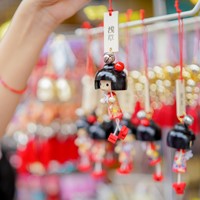Essential Japanese Phrases and Etiquette for Shopping in Japan

This article is contributed by Wakoku.
Navigating shops in Japan can be both exciting and intimidating for international visitors. The unique combination of language barriers and distinct cultural practices makes shopping an adventure in itself. Whether you're browsing department stores in Tokyo, exploring traditional markets in Kyoto, or picking up necessities at a local konbini (convenience store), knowing the right phrases and customs will transform your shopping experience from potentially awkward to genuinely enjoyable.
Why Understanding Shopping Etiquette in Japan Matters
In Japan, shopping isn't just a transaction, it's an experience deeply rooted in respect, efficiency, and attention to detail. Store employees pride themselves on providing exceptional service, and customers are expected to follow certain unwritten rules. Breaking these customs might not get you thrown out of a store, but understanding them will help you blend in and receive better service while showing respect for local traditions.
What You will Learn in This Article
- Essential Japanese Phrases for Shopping Success
- Cultural Shopping Etiquette That Makes a Difference
- Shopping Location-Specific Etiquette
- Common Shopping Mistakes to Avoid
- Tech-Savvy Shopping Tips
- Seasonal Shopping Considerations
- FAQ: Japanese Shopping Etiquette
Essential Japanese Phrases for Shopping Success

Making Initial Inquiries
When first entering a store or looking for specific items, these phrases will help you get started:
| Japanese | Romaji | English |
| いらっしゃいませ | Irasshai mase | Welcome (You'll hear this from staff) |
| こんにちは | Konnichiwa | Hello |
| [item] はどこですか? | [Item] wa doko desu ka? | Where is the [item]? |
| これを探しています | Kore o sagashite imasu | I'm looking for this. (Show a picture) |
| 手伝っていただけますか? | Tetsudatte itadakemasu ka? | Could you help me, please? |
Real-life example: When looking for a specific brand of cosmetics, you might say: "シャネルの化粧品はどこですか?" (Shaneru no keshōhin wa doko desu ka? / Where are the Chanel cosmetics?)
Asking About Products
Curious about an item's features or available options? These phrases will come in handy:
| Japanese | Romaji | English |
| これはいくらですか? | Kore wa ikura desu ka? | How much is this? |
| 全部でいくらですか? | Zenbu de ikura desu ka? | How much is it in total? |
| 試着してもいいですか? | Shichaku shite mo ii desu ka? | May I try it on? |
| ほかのサイズはありますか? | Kore o sagashite imasu | Do you have another size? |
| ほかの色はありますか? | Hoka no iro wa arimasu ka? | Do you have other colors? |
Pro tip: When trying on clothes, always ask first instead of assuming it's okay to try items on.
Making a Purchase
Ready to buy? These phrases will help you seal the deal:
| Japanese | Romaji | English |
| これをください | Kore o kudasai | I'll take this, please. |
| クレジットカードは使えますか? | Kurejitto kādo wa tsukae masuka? | Can I pay by credit card? |
| 現金でもいいですか? | Genkin demo ii desu ka? | Can I pay with cash? |
| 免税手続きはできますか? | Menzei tetsuzuki wa dekimasu ka? | Do you offer tax-free shopping? |
| レシートをください | Reshīto o kudasai | Receipt, please. |
Cultural note: Unlike in some countries, saying "I'll take this" (Kore o kudasai) is considered polite and direct in Japanese shopping contexts.
Extras and Packaging
Need gift wrapping or a shopping bag? These phrases cover those final details:
| Japanese | Romaji | English |
| ラッピングをお願いします | Rappingu o onegai shimasu | Please wrap this.(Gift wrapping) |
| レジ袋をください | Rejibukuro o kudasai | Please give me a shopping bag. |
| そのままでいいです | Sono mama de ii desu | It's fine just as it is. |
| 箸をください | Hashi o kudasai | Chopsticks, please.(For food purchases) |
Remember: Many stores in Japan now charge for plastic bags, so bringing your own eco-bag is both economical and environmentally friendly.
Cultural Shopping Etiquette That Makes a Difference

Understanding the unspoken rules of Japanese shopping culture is just as important as knowing the right phrases. Here are the key customs to follow:
Payment Practices
・Use the money tray:
When paying with cash, place your money on the tray provided rather than handing it directly to the cashier.
・No tipping:
Tipping is not customary in Japan and can actually cause confusion or discomfort for staff.
・No bargaining:
Prices are fixed in most Japanese stores. Attempting to haggle is generally considered impolite.
In-Store Behavior
・Remove shoes in changing rooms:
Most clothing stores expect customers to remove their shoes before entering changing rooms.
・Use face covers when trying on clothes:
Many stores provide protective face covers to prevent makeup from transferring to garments.
・Don't eat or drink:
Consuming food or beverages while shopping is typically prohibited.
・Use tongs for bakery items:
When selecting baked goods, always use the provided tongs rather than your hands.
・Ask before trying products:
Particularly with fragile or expensive items, ask staff permission before testing them.
Umbrella Etiquette
During rainy seasons, you'll find umbrella stands outside most shops. Use them! Alternatively, many stores provide plastic umbrella bags at entrances to prevent wet umbrellas from being brought inside.
Shopping Location-Specific Etiquette
Different shopping venues have their own specific customs:
Department Stores (デパート - Depāto)
・Staff may bow when you enter their department
・Floors are organized by category (women's fashion, household goods, etc.)
・Food halls are typically in the basement level (called "depachika")
・Sales staff will meticulously wrap your purchases
Convenience Stores (コンビニ - Konbini)
・Greet the staff with a simple "konnichiwa"
・Ready-to-eat food can typically be heated up on request
・Many services available (bill payment, ticket purchasing, ATM)
・Efficient checkout process; have payment ready
Traditional Markets (市場 - Ichiba)
・Early morning is best for the freshest products
・Some vendors may offer samples
・Pointing and showing numbers with fingers works well
・Photography may be restricted in some areas
Common Shopping Mistakes to Avoid
Even seasoned travelers can make cultural missteps. Here are some common mistakes to avoid:
1. Opening packaging before purchase:
Always ask staff to help if you want to examine a packaged item.
2. Expecting refunds for change of mind:
Most Japanese stores don't accept returns unless the product is defective.
3. Touching produce excessively:
In supermarkets, avoid handling produce unless you intend to purchase it.
4. Talking loudly on your phone:
Maintaining a quiet shopping environment is appreciated.
5. Rushing sales staff:
Service in Japan is thorough and may take longer than you're used to.
Tech-Savvy Shopping Tips
Modern technology can help bridge the language gap:
・Translation apps:
Google Translate or DeepL can help with real-time translation.
・IC cards:
Prepaid cards like Suica or PASMO can be used for shopping in many stores.
・QR code payments:
Services like PayPay, LINE Pay, or d-Payment are increasingly accepted.
・Point cards:
Many chains offer loyalty programs with significant discounts.
Seasonal Shopping Considerations
Japan's shopping scene changes with the seasons:
・New Year (January):
Lucky bags ("fukubukuro") offer mystery items at discounted prices.
・Golden Week (Late April-Early May):
Many special promotions but also crowds.
・Summer sales (July-August):
Major discounts in most department stores.
・Winter sales (December-January):
Another prime time for bargains.
FAQ: Japanese Shopping Etiquette
Q: Do I need to speak Japanese to shop in Japan?
A: No, you don't need to speak Japanese to shop in Japan. Basic phrases and gestures will help you navigate most shopping situations.
Q: Are credit cards widely accepted in Japan?
A: Major stores in urban areas accept credit cards, but smaller shops and rural areas may be cash-only. Always carry some cash.
Q: Can I get tax-free shopping as a tourist?
A: Yes, tourists can shop tax-free (consumption tax exemption) at many stores for purchases over 5,000 yen by showing their passport.
Q: Is it rude to try on clothes in Japanese stores?
A: No, but always ask first with "Shichaku shite mo ii desu ka?" and remove your shoes before entering changing rooms.
Q: Should I bring my own shopping bags?
A: Yes, bringing reusable bags is recommended as many stores now charge for plastic bags.
Final Thoughts
Shopping in Japan combines efficiency, excellent service, and distinct cultural practices. By learning a few key phrases and respecting local customs, you can enhance your experience significantly while showing respect for Japanese culture. The effort to understand and follow these traditions not only makes your shopping smoother but also creates more meaningful cultural connections during your visit.
Whether you're planning your first trip or preparing for a return visit, these phrases and etiquette guidelines will serve as valuable tools in your travel toolkit. Japanese shopping culture offers a fascinating glimpse into the broader values of Japanese society; efficiency, respect, attention to detail, and harmonious social interactions.
Remember, the most important shopping phrase in Japan might just be "arigatou gozaimasu" (thank you very much); a simple expression of gratitude that is universally understood and always appreciated.
Learn Japanese with Wakoku’s Step-by-Step Guides
Build your Japanese skills with easy-to-follow study guides, expert tips, and practical examples. From grammar and kanji to real-life conversation, Wakoku helps you learn with confidence—at your own pace.










